
Liberia, officially the Republic of Liberia, is a country on the West African coast. It is bordered by Sierra Leone to its northwest, Guinea to its north, Ivory Coast to its east, and the Atlantic Ocean to its south and southwest. It has a population of around 5 million and covers an area of 43,000 square miles (111,369 km2). The country's official language is English; however, over 20 indigenous languages are spoken, reflecting the country's ethnic and cultural diversity. The capital and largest city is Monrovia.

Wilberforce University is a private historically black university in Wilberforce, Ohio. Affiliated with the African Methodist Episcopal Church (AME), it was the first college to be owned and operated by African Americans. It participates in the United Negro College Fund.
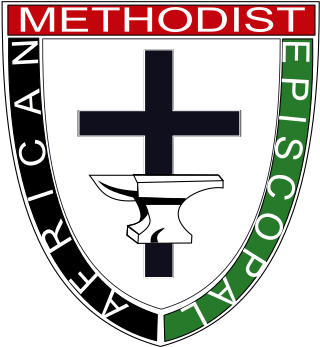
The African Methodist Episcopal Church, usually called the AME Church or AME, is a Methodist Black church. It adheres to Wesleyan-Arminian theology and has a connexional polity. The African Methodist Episcopal Church is the first independent Protestant denomination to be founded by black people; though it welcomes and has members of all ethnicities.

The African Methodist Episcopal Zion Church, or the AME Zion Church (AMEZ) is a historically African-American Christian denomination based in the United States. It was officially formed in 1821 in New York City, but operated for a number of years before then. The African Methodist Episcopal Zion Church adheres to Wesleyan-Arminian theology.

Bennett College is a private historically black liberal arts college for women in Greensboro, North Carolina. It was founded in 1873 as a normal school to educate freedmen and train both men and women as teachers. Originally coed, in 1926 it became a four-year women's college. It is one of two historically black colleges that enroll only women, the other being Spelman College.

Edward Waters University is a private Christian historically Black university in Jacksonville, Florida. It was founded in 1866 by members of the African Methodist Episcopal Church as a school to educate freedmen and their children. It was the first independent institution of higher education and the first historically black college in the State of Florida. It continues to be affiliated with the AME Church and is a member of the Independent Colleges and Universities of Florida.
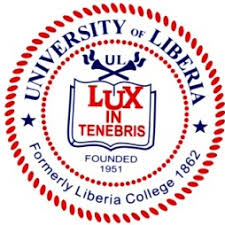
The University of Liberia is a publicly funded institution of higher learning located in Monrovia, Liberia. Authorized by the national government in 1851, the university opened in 1862 as Liberia College. UL has four campuses: the Capitol Hill Campus in Monrovia, the Fendall campus in Louisiana, outside Monrovia, the Medical School Campus in Congo Town, and the Straz-Sinje Campus in Sinje Grand Cape Mount County. The university enrolls approximately 18,000 students and is one of the oldest institutions of higher learning in West Africa. It is accredited by the Liberian Commission on Higher Education.

Daniel Alexander Payne was an American bishop, educator, college administrator and author. A major shaper of the African Methodist Episcopal Church (AME), Payne stressed education and preparation of ministers and introduced more order in the church, becoming its sixth bishop and serving for more than four decades (1852–1893) as well as becoming one of the founders of Wilberforce University in Ohio in 1856. In 1863, the AME Church bought the college and chose Payne to lead it; he became the first African-American president of a college in the United States and served in that position until 1877.
Theophilus Ernest Eastman was a Liberian diplomat, statesman and politician. A leading member of the young and dynamic foreign policy team at the Department of State in the 1960s during the Tubman administration, he was a major architect of President Tubman's extensive involvement in Pan-African politics, serving first as Director of the Africa-Asia Bureau and then as Under-Secretary of State. In 1972, President Tolbert appointed him Ambassador to Kenya, Uganda, and Tanzania, resident in Nairobi, Kenya. He later served, from 1978 to 1983, as the second Secretary-General of the Mano River Union. From 1983 to 1986, he was the Minister of Foreign Affairs under dictator Samuel Doe, succeeding Henry Boimah Fahnbulleh and preceding John Bernard Blamo. President Charles Ghankay Taylor later appointed him to be the Minister of State for Presidential Affairs before returning him to the Foreign Ministry. He represented the National Patriotic Party at ECOWAS-sponsored peace talks in Banjul.

Cuttington University is a private university in Suacoco, Liberia. Founded in 1889 as Cuttington College by the Episcopal Church of the United States (ECUSA), it is the oldest private, coeducational, four-year, degree-granting institution in sub-Saharan Africa.
Henry Boimah Fahnbulleh, Jr. is a Liberian politician and diplomat. He most recently served in the Liberian Government as National Security Advisor in the Ellen Johnson Sirleaf administration. Immediately previous to his appointment as National Security Advisor, he served as Advisor on International Affairs in the same government. He served as Foreign Minister from 1981 to 1983 under President Samuel Doe.
Black Methodism in the United States is the Methodist tradition within the Black Church, largely consisting of congregations in the African Methodist Episcopal (AME), African Methodist Episcopal Zion, Christian Methodist Episcopal denominations, as well as those African American congregations in other Methodist denominations, such as the Free Methodist Church.

Education in Liberia was severely affected by the First Liberian Civil War and Second Liberian Civil War, between 1989 and 2003. In 2010, the literacy rate of Liberia was estimated at 60.8%.

Johnnie N. Lewis was a Liberian lawyer and politician who served as the 18th Chief Justice of Liberia from 2006 to 2012. Before his appointment to the Supreme Court, he served as a circuit judge in Liberia's judicial system.

William Henry (Harrison) Heard was a clergyman of the African Methodist Episcopal Church who served as United States Ambassador to Liberia from 1895 through 1898.
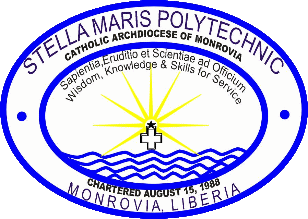
Stella Maris Polytechnic University (SMPU) is a private university in Monrovia, Liberia. Founded in 1988, the school is owned and operated by the Roman Catholic Archdiocese of Monrovia. Located on Capitol Hill, the school has approximately 2,300 students. The school is recognized by Liberia's National Commission on Higher Education as an approved baccalaureate granting school of higher learning, and is a member of the Association of African Universities.
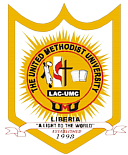
The United Methodist University (UMU) is a private institution of higher learning located in Monrovia in the West African nation of Liberia. Established in 1998 and opened in 2000, the school had 9,118 students as of 2016. UMU is certified by the Liberian government's National Commission on Higher Education to grant both bachelor's and master's degrees.
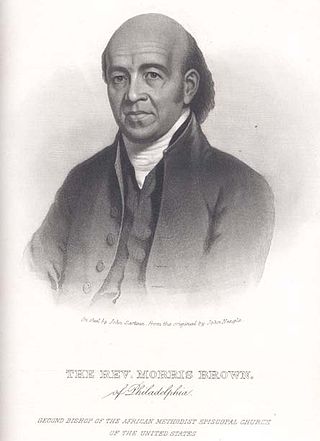
Morris Brown was one of the founders of the African Methodist Episcopal Church, and its second presiding bishop. He founded Emanuel AME Church in his native Charleston, South Carolina. It was implicated in the slave uprising planned by Denmark Vesey, also of this church, and after that was suppressed, Brown was imprisoned for nearly a year. He was never convicted of a crime.
Rev. John E. Price was an elder and minister of the African Methodist Episcopal Zion Church. He was a minister for around 50 years. He was the founder and president of the Garnet Equal Rights League at Harrisburg. He wrote hymns and was an editor for the Zion Church Advocate and, with William H. Day, the Zion Church Herald and Outlook, the first paper of the AME Zion Church. Day was a minister, abolitionist, and educator.















